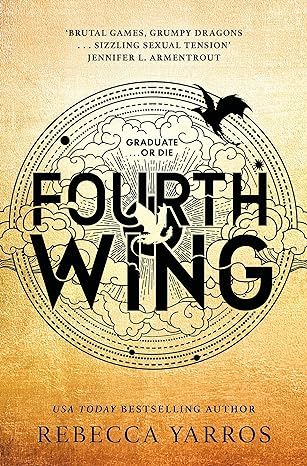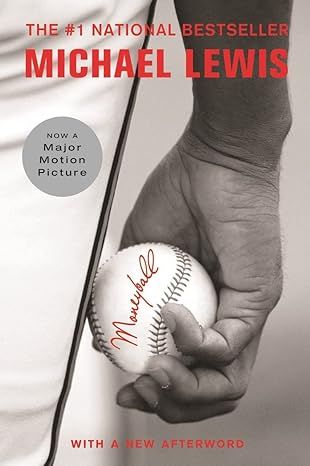Moneyball: The Art of Winning an Unfair Game
4.6
-
6,969 ratings
"This delightfully written, lesson-laden book deserves a place of its own in the Baseball Hall of Fame." ―Forbes
Moneyball is a quest for the secret of success in baseball. In a narrative full of fabulous characters and brilliant excursions into the unexpected, Michael Lewis follows the low-budget Oakland A's, visionary general manager Billy Beane, and the strange brotherhood of amateur baseball theorists. They are all in search of new baseball knowledge―insights that will give the little guy who is willing to discard old wisdom the edge over big money.
Kindle
$8.61
Available instantly
Audiobook
$0.00
with membership trial
Hardcover
$18.90
Paperback
$12.62
Ships from
Amazon.com
Payment
Secure transaction
ISBN-10
0393324818
ISBN-13
978-0393324815
Print length
336 pages
Language
English
Publisher
W. W. Norton & Company
Publication date
March 16, 2004
Dimensions
5.5 x 0.9 x 8.3 inches
Item weight
2.31 pounds
Popular Highlights in this book
There was, for starters, the tendency of everyone who actually played the game to generalize wildly from his own experience. People always thought their own experience was typical when it wasn’t.
Highlighted by 2,590 Kindle readers
That the ability to control the strike zone was the greatest indicator of future success. That the number of walks a hitter drew was the best indicator of whether he understood how to control the strike zone.
Highlighted by 2,414 Kindle readers
“Managers tend to pick a strategy that is least likely to fail rather than pick a strategy that is most efficient,” said Palmer. “The pain of looking bad is worse than the gain of making the best move.”
Highlighted by 1,070 Kindle readers
Product details
ASIN :
B000RH0C8G
File size :
694 KB
Text-to-speech :
Enabled
Screen reader :
Supported
Enhanced typesetting :
Enabled
X-Ray :
Enabled
Word wise :
Enabled
Editorial Reviews
"The best book of the year, [Moneyball] already feels like the most influential book on sports ever written. If you're a baseball fan, Moneyball is a must." ― People
"Lewis has hit another one out of the park…You need know absolutely nothing about baseball to appreciate the wit, snap, economy and incisiveness of [Lewis's] thoughts about it." ― Janet Maslin, New York Times
"Moneyball is the best business book Lewis has written. It may be the best business book anyone has written." ― Mark Gerson, Weekly Standard
"By playing Boswell to Beane's Samuel Johnson, Lewis has given us one of the most enjoyable baseball books in years." ― Lawrence S. Ritter, New York Times Book Review
"It’s a sports story that’s actually a business story that’s also a story about preconceptions. Plus, Michael Lewis’s writing is so clear, readable, and highly entertaining." ― Charles Yu, Literary Hub
"Ebullient, invigorating…Provides plenty of action, both numerical and athletic, on the field and in the draft-day war room." ― Lev Grossman, Time
"A journalistic tour de force." ― Richard J. Tofel, Wall Street Journal
"Michael Lewis's beautiful obsession with the idea of value has once again yielded gold…Moneyball explains baseball's startling new insight; that for all our dreams of blasts to the bleachers, the sport's hidden glory lies in not getting out." ― Garry Trudeau
"I understood about one in four words of Moneyball, and it's still the best and most engrossing sports book I've read in years. If you know anything about baseball, you will enjoy it four times as much as I did, which means that you might explode." ― Nick Hornby, The Believer
"Rarely has the lesson of a book...had such an enormous impact....[Moneyball] showcase[s] Lewis’s great gift of finding the perfect characters and narratives to animate big, complex ideas that have been hiding in plain sight." ― Daniel Riley, GQ
Sample
Lately in a wreck of a Californian ship, one of the passengers fastened a belt about him with two hundred pounds of gold in it, with which he was found afterwards at the bottom. Now, as he was sinking—had he the gold? or the gold him? —John Ruskin, Unto This Last
PREFACE
I WROTE THIS BOOK because I fell in love with a story. The story concerned a small group of undervalued professional baseball players and executives, many of whom had been rejected as unfit for the big leagues, who had turned themselves into one of the most successful franchises in Major League Baseball. But the idea for the book came well before I had good reason to write it—before I had a story to fall in love with. It began, really, with an innocent question: how did one of the poorest teams in baseball, the Oakland Athletics, win so many games?
For more than a decade the people who run professional baseball have argued that the game was ceasing to be an athletic competition and becoming a financial one. The gap between rich and poor in baseball was far greater than in any other professional sport, and widening rapidly. At the opening of the 2002 season, the richest team, the New York Yankees, had a payroll of $126 million while the two poorest teams, the Oakland A’s and the Tampa Bay Devil Rays, had payrolls of less than a third of that, about $40 million. A decade before, the highest payroll team, the New York Mets, had spent about $44 million on baseball players and the lowest payroll team, the Cleveland Indians, a bit more than $8 million. The raw disparities meant that only the rich teams could afford the best players. A poor team could afford only the maimed and the inept, and was almost certain to fail. Or so argued the people who ran baseball.
And I was inclined to concede the point. The people with the most money often win. But when you looked at what actually had happened over the past few years, you had to wonder. The bottom of each division was littered with teams—the Rangers, the Orioles, the Dodgers, the Mets—that had spent huge sums and failed spectacularly. On the other end of the spectrum was Oakland. For the past several years, working with either the lowest or next to lowest payroll in the game, the Oakland A’s had won more regular season games than any other team, except the Atlanta Braves. They’d been to the play-offs three years in a row and in the previous two taken the richest team in baseball, the Yankees, to within a few outs of elimination. How on earth had they done that? The Yankees, after all, were the most egregious example of financial determinism. The Yankees understood what New York understood, that there was no shame in buying success, and maybe because of their lack of shame they did what they did better than anyone in the business.
As early as 1999, Major League Baseball Commissioner Allan H. (“Bud”) Selig had taken to calling the Oakland A’s success “an aberration,” but that was less an explanation than an excuse not to grapple with the question: how’d they do it? What was their secret? How did the second poorest team in baseball, opposing ever greater mountains of cash, stand even the faintest chance of success, much less the ability to win more regular season games than all but one of the other twenty-nine teams? For that matter, what was it about baseball success that resisted so many rich men’s attempt to buy it? These were the questions that first interested me, and this book seeks to answer.
Read more
About the authors
Michael Lewis
Michael Lewis, the best-selling author of The Undoing Project, Liar's Poker, Flash Boys, Moneyball, The Blind Side, Home Game and The Big Short, among other works, lives in Berkeley, California, with his wife, Tabitha Soren, and their three children.
Reviews
Customer reviews
4.6 out of 5
6,969 global ratings

justlikethegame
5
Finding a new way to win
Reviewed in the United States on November 3, 2013
Verified Purchase
Michael Lewis is an engaging storyteller. I came to this book via the film with Brad Pitt and Jonah Hill and I'm glad I read the book. Of course, as with all books, there's more to the story than the film suggests. The book includes the fact that Beane inherited the statistical analysis approach he uses with the Oakland Athletics from his predecessor, Sandy Alderson. The film gives the impression that Beane arrived at it after meeting his assistant GM. However, even though he did not originate the approach Beane was among the early adopters of it and seems to have been willing to fully commit to it. Beane himself is portrayed as a very intense character, often prone to violent outbursts, but still an effective leader.
What I love about this story is that it is about a team faced with what seems like intractable adversity who find a new way to compete. Although I don't believe that statistical analysis alone is as effective as it sometimes seems, I do believe that it is far more valuable than its opponents would contend. Practitioners should take the same warnings as those provided for people looking into the stock market: "past performance is no guarantee of future gains." Once that is understood, the stats are far from meaningless. Baseball, like most forms of conflict and competition, is a fluid situation with innumerable variables at play including luck and chaos. Reality cannot be reduced to numbers, but it can be better understood with the RIGHT numbers.
The profiles of Billy Beane and key Oakland A's players from this period are seen by some readers as digressions, but I experienced them as along the theme of adaptation to adversity and finding new ways to win. Beane did not experience much success as a major league player, but he adapted and went into scouting and then management at which he has been very successful (though not as successful as he would like). The two players most prominently featured are Scott Hatteberg and Chad Bradford, both with very interesting stories. Hatteberg moved from catcher to first base after nerve damage in his elbow. Bradford was a pitcher with an unconventional delivery whose pitching style looked awkward despite his competence at deceiving batters.
Some have criticized this book because the Oakland A's have not performed well in the past couple of years under Beane's continued tenure as GM. That criticism is as absurd as readers of Jim Collins' book Good to Great who dismiss his conclusions about successful companies. Both books are about practices and processes that contribute to success. In the case of Moneyball, the rest of the league has been adopting these approaches and they have become less and less of an advantage. Also, the game goes on, and teams are finding new ways to compete. The point is, according to the conventional wisdom of the time, no team with a fraction of the payroll of the NY Yankees should've been able to compete or have similar success to the Yankees, but the A's did. The story is, in a sense, time bound, but the principles about adaptation, being stalwart in the face of those who resist meaningful change, and finding value where others see none (aka market inefficiencies), are all themes Lewis illustrates and develops effectively.
The baseball minutiae can bother some readers, but I found it necessary to the story and it is spread out and well explained by the author. Overall it is a very enjoyable book and, in my opinion, very inspiring stories.
Read more
3 people found this helpful

O. Halabieh
5
Value Investing meets Baseball!
Reviewed in the United States on February 11, 2012
Verified Purchase
This book tells the story of the Oakland A's general manager Billy Beane and his team building philosophy/approach. Billy has focused on drafting undervalued or overlooked players and building a great team on a budget. Unlike most of his GM peers, Billy and his team rely on empirical statistics to make decisions on a more systematical fashion. He understands that to beat the other teams who have much largers budgets he cannot play the same game they are. Instead he applies - what I call - a Benjamin Graham value investing style approach to picking players (stocks) and building a team (portfolio). The outcome a team that pays the lowest on a per win basis within the league.
Michael does it again, with his great story telling approach to reporting. A recommended read for any baseball or business enthusiast alike.
Below are key excerpts from the book:
-
"The meetings, from their point of view, are all about minimizing risk. They can't afford to have guys not work out. There's no point in taking risks on players temperamentally, or legally, unsuited to pro ball."
-
"We're blending what we see but we aren't allowing ourselves to be victimized by what we see."
-
"When Alderson entered the game he wanted to get his mind around it, and he did. He concluded that everything from on-field strategies to player evaluation was better conducted by scientific investigation - hypotheses tested by analysis of historical statistical baseball data - than by reference to the collective wisdom of old baseball men. By analyzing baseball statistics you could see through a lot of baseball nonsense."
-
"Managers tend to pick a strategy that is least likely to fail rather than pick a strategy that is most efficient," said Palmer. " The pain of looking bad is worse than the gain of making the best move."
-
John Henry: "People in both fields operate with beliefs and biases. To the extent you can eliminate both and replace them with data, you gain a clear advantage. Many people think they are smarter than others in the stock market and that the market itself has no intrinsic intelligence - as if it's inert. Many people think they are smarter than others in baseball and that the game on the field is simply what they think it is through their set of images/beliefs. Actual data from the market means more than individuals perception/belief. The same is true in baseball."
-
"The important thing is not to recreate the individual," Billy Bean would later say. "The important thing is to recreate the aggregate."
-
"No matter how successful you are, change is always good. There can never be a status quo. When you have no money you can't afford long-term solutions, only short-term ones. You have to always be upgrading. Otherwise you're fu**ed."
-
"The day you say you have to do something, you're screwed. Because you are going to make a bad deal. You can always recover from the player you didn't sign. You may never recover from the player you signed at the wrong price."
-
"Know exactly what every player in baseball is worth to you. You can put dollar figure on it."
-
"Know exactly what you want and go after him." (Never mind who they say they want to trade.)
-
"Every deal you do will be publicly scrutinized by subjective opinion. If I'm [IBM CEO] Lou Gerstner, I'm not worried that every personnel decision I make is going to wind up on the front page of the business section. Not everyone believes that they know everything about the personal computer. But everyone who ever picked up a bat thinks he knows baseball. To do this well, you have to ignore the newspapers."
-
Bill James: "1) Every form of strength covers one weakness and creates another, and therefore every form of strength is also a form of weakness and every weakness is a strength. 2) The balance of strategies always favors the team which is behind. 3) Psychology tends to pull the winners down and push the losers upwards."
-
"I learned that if you look long enough for an argument against reason you will find it."
Read more
7 people found this helpful
M J Heilbron Jr.
5
On the short list of great baseball books...
Reviewed in the United States on June 2, 2005
Verified Purchase
...we need to find space for Michael Lewis' "Moneyball"
This deservedly sits on my shelf alongside books by Kahn, Halberstam and Angell.
A brief description would be "the story of Billy Beane" and his tenure as GM of the Oakland A's.
That's selling it short. By a mile.
This book is educational, informative and inspiring. It is a book that makes you look at baseball with new eyes. It takes you, briefly but lucidly, into the world of the draft, high school sports, minor leagues, retired players, coaches at all levels, computers, the language of statistics...and above all, the inside world of major league baseball. But this time, from a point of view...from a manner of thinking...you have never considerd.
For some strange reason, it now makes me look at my world of medicine in new ways.
Here's the thing: it's more important to not make an out, than it is to get a hit.
It took a few minutes for that to really sink in, but that subtle shift in perspective makes an enormous amount of difference. It really does.
Lewis, through the tale of Billy Beane, makes this idea crystalline in clarity with statistics and theory, but not robbing the story of any of its' humanity.
Beane was a high school phenom; Lewis does some of his best work describing what it must be like to be one. He doesn't make it in the bigs, but through some pretty radical decision-making, ends up the GM of the A's.
You will follow a few players from their drafting to singular moments in their careers, and you will cheer. Out loud.
I did.
I read this entire book on a flight from Detroit to L.A., and many of my fellow passengers thought me daft. A loon. Here's this guy, in his window seat, woo-hooing while reading a hardcover book. Laughing out loud. Saying "Yesss!" like some bad Marv Albert impersonator.
Scott Hatteberg will stick with me for the rest of my life. I feel like I know the guy. I wanna have him over for dinner. As I do Billy Beane, and Mr. Lewis as well.
There are over a half dozen other people who spring to life, due to some terrific writing, but if you've read this far, I want you to discover them on your own.
How many times in your life will you read a book that changes fundamentally the way you look at something? Something that you have thought pretty much the same about since childhood.
Since Little League and watching my beloved Dodgers back in the 70's, stealing second was "good", a sacrifice bunt was "going by the book"...there are whole tenets of baseball wisdom that are challenged here, but challenged for the love of the game, not the contrary.
His quote from Bill James (a person I now feel I must seek out and buy all his books...) about errors being a statistic of "opinion" made total sense to me; I almost felt like an idiot that I never thought that way about it myself.
If you love baseball, if you only like baseball, if you like a great story well told, your next purchase NEEDS to be this book. I guarantee...guarantee, mind you...that you will not be disappointed.
Read more
10 people found this helpful
M. Allen Greenbaum
5
4 1/2 The Rational
Reviewed in the United States on August 30, 2006
Verified Purchase
Field of Stats
Although the steroid scandal may have eventually accomplished the same thing, "Moneyball" destroys any persistent romance surrounding professional baseball. It's an antidote to all those paeans glorifying the love of the game: "The Natural," "Field of Dreams," even the raunchy lens of "Bull Durham." Players don't rise and fall due to the nobility of their character, the sheer beauty of their swing, the sage advice of a wizened baseball scout, or even their batting average, per se. What Moneyball does is show how the Oakland A's, and a few emulators, dismissed all this lore and culture in favor of multiple regressions and other advanced statistical tools. It's a fascinating book that could have been a dry one--full of detailed statistics and equations--except that Lewis cleverly balances the mathematical perspective with the same character studies that have graced sports biographies for years.
The book centers around former big league prospect Billy Beane, a man with great athletic ability who didn't make it in the bigs, partly because of his perfectionism and resulting temper. Years later, Beane is the general manager of the Oakland Athletics, a team with stingy owners who'd rather save some bucks than buy a pennant (see "Yankees, The"). Faced with a shoestring budget, and enamored with the new baseball analysis cultivated by Bill James in his "Baseball Digest" system, Beane and his advisors invest in players as if they're brokers on Wall Street. James and other highly-educated baseball fanatics (often from Harvard, often lawyers or scientists with a mathematical bent) discover that the old wisdom wasn't all that smart: Their analyses yield cold, objective facts, and suddenly, as in the old "Firesign Theater" skit, "Everything You Know Is Wrong." It's not batting average and RBIs that are most important, it's on-base and slugging percentage that predict the one thing, the only outcome that matters--who wins. Throw out fielding statistics--these are too dependent on luck and the kind of pitches served up. Furthermore, invest in bargains: Overlooked players who get to first through walks rather than singles (the phrase, "a walk is good as a hit," was never so true as it is here), guys who aren't great all-around players but who fill complete missing elements in your roster (sort of like diversifying your portfolio, Beane and others take their cue from a market mechanism known as "derivatives"), and those who otherwise don't fit into other GMs' and scouts atheoretical notion of what makes a great player.
The results are convincing. With one of the least expensive teams in baseball, the A's repeatedly make the playoffs. Beane acquires college players and castoffs from other teams like a man who collects trashy art, and XXX shows how his "I must be insane to offer you these bargains" style of purchasing ball players pays off, mostly through chapters devoted to one particular exemplar of Beane's philosophy.
There are a few problems with the book, as there are a few problems with the stats-driven approach to building your team. The most egregious of these is Lewis' concentration on the successes predicted by statistics. For a book driven by science, Lewis ignores the other 3 cells of the implicit 2x2 table of success/failure by "uses Beane method"/"doesn't use method." The most significant is the failure/Beane method cell; Lewis just doesn't write about those players who didn't pan out as mathematically predicted. The only examination of failure is Beane's rather clinical excuse for never advancing very far in the playoffs--in a short series (I.e., when N is small), luck (i.e., the statistical error) tends to become more powerful and empirical "truths" suffer as a result. The fans suffer too, but their enjoyment of the game is always secondary to winning. Therefore, Athletics almost never steal bases (the percentages dictate no), and managerial and player judgment is minimized in favor of the all mighty victory. You have to admit it works, but when Beane shrugs off the post-season failure question almost with a "that's not my job," you have to wonder whether "Moneyball" is enough. Maybe it's just the best oine can do on a budget. (On the other hand, XXX Lewis to mention--even in his most recently written epilogue--that Beane's right hand man Paul DePodesta was fired after 2 seasons with the well-financed Dodgers.(A 71-91, 4th place finish in 2005 didn't help DePodesta.) Along with this bias towards success stories, XXX reveals a few bad writing habits. He'll sometimes describe something with sentences repeatedly beginning with the word "that." As in: "That the book doesn't look enough at failures. That the book was a best seller. That the book was reportedly misunderstood by many when published." Lewis also lapses into a high-falutin' prose style, somewhat emulating "King James"--Bill James of the pioneering Baseball Digest school of analysis.
Still, "Moneyball" deserves its reputation and its sales. Beane's number-crunching, myth-busting approach isn't always pretty, but it makes sense and meets the bottom line of both winning and preserving capital. An excellent and accessible book that has it both ways, an argument for using "cold" higher math in sports, and a spirited study of the ballplayers who add value to the original purchase, and the GMs who know what it takes to buy low and sell high.
Read more
9 people found this helpful
Hamilton Beck
4
What are the lessons?
Reviewed in the United States on December 17, 2013
Verified Purchase
As someone who scans the headlines but does not otherwise follow baseball, I was hoping to learn lessons from this book that could be applied to sports in general, or at least football and soccer. Let me say first off that while there may be such lessons (though fewer for leagues with a salary cap, like the NFL), one thing I quickly discovered is that there sure are a lot of baseball players I never heard of.
So, what are the sports lessons? On the one hand, Moneyball is about statistics, the key insight being the importance of “inefficiencies in the system.” To a large degree this means determining which stats are the key to winning and – here’s a point that does not get emphasized enough – putting a dollar value on them. The implication is that a player’s total value can be calculated by figuring out the dollar amount you can assign to each of his individual skills. Then see which players on your team are overvalued, sell them and replace them with unknowns who are undervalued by the market but can perform just as well at lower cost. Billy Beane phrases it this way (he’s talking about replacing a player): “The important thing is not to recreate the individual. The important thing is to recreate the aggregate.” Because in Beane’s eyes that’s all a player is: an aggregation of skills. When in the course of time these younger players start to demand big bucks, they too are let go. It’s all about winning on a shoestring. Which makes sense if you’re managing a low-budget outfit like the Oakland A’s.
What’s the downside? Evaluating players by stats alone may be efficient, but it’s also ruthless. It exposes management’s eternal mantra that “we’re all a family” as mostly claptrap. It leaves little room for rewarding loyalty. Whether we’re talking about baseball, football, soccer or basketball – the point is that these are all team sports, obviously. And that means there are certain intangibles such as team spirit and leadership which cannot be quantified. Think of the franchise players on your favorite team – would you trade them virtually at the drop of a hat if you could find a couple of no-names who, according to a spreadsheet, had the potential to produce just as well? Well, you would if you really believed, like Beane does, that there’s nothing you can’t put a dollar figure on. Followed to its logical conclusion, you might end up having less a cohesive team than a bunch of misfit toys. It’s no accident that Moneyball lacks a chapter on team chemistry.
On the other hand, this book is not just about baseball stats – a subject which would not automatically appeal to a wider audience. You’ve got to have some human interest. Where does Michael Lewis find it? Aside from Beane and some members of his staff, he discovers it in the stories of those who benefit from the system: the unsung players, diamonds in the rough who don’t look like marquee players or even think of themselves as being very good. Players nobody else wants, who are taken on board and turned into winners. The chief joy of Moneyball comes from reading about these underdogs.
But if they are the winners, who are the losers in this system? I missed the stories about those who, either through talent or hard work or both, have risen to the top and can command high salaries, only to find themselves traded for no other reason than “inefficiency in the system.” We’re not necessarily talking about players who have stopped producing either. Where are Lewis’s tales about the shock of being a star one week and finding yourself on the trading block the next? No heart-warming human interest there – to Lewis (and Beane), those guys are like overpriced stocks, to be unloaded before their value starts to decline. No matter how much these players have contributed to the team, or how much we fans have come to like them, no matter if they are still performing at a high level, evidently once they get that oversized paycheck, it’s time to start thinking of how best to cut them loose. The movie is actually much better about this aspect than the book. It goes a long way towards humanizing Beane, who appears somewhat callous in the book, by showing that he acknowledges this fact and tries to rationalize it – “They’re professionals,” Brad Pitt says, “they can handle it.”
Many reviewers praise Moneyball for the business lessons it contains. Of course there are useful tips such as – “don’t accept something just because that’s the way we’ve always done it,” and “it pays to think outside the box,” and “dare to be different” – all commendable. At the same time, it should be kept in mind that the advice given in Moneyball pertains best to organizations like the Oakland A’s: undercapitalized firms that are forced to compete with the big boys. The book shows you how to punch above your weight for a while – but is not a formula for on-going success. As Beane himself puts it, “When you have no money you can’t afford long-term solutions, only short-term ones.” He didn’t manage his team this way because he liked to, but because, given his budget constraints, he had little choice. I worry that the chief lesson CEO’s will take away is: In the name of rationality, it’s okay to treat your employees as though they were members of your fantasy team. The movie makes it explicit that this is one reason Beane does not like to watch his team play – if he did, he might form an emotional attachment to some players he’s inevitably going to trade away. The other reason being: superstition – his presence might jinx the team.
Keep in mind, too, that this book was written long before the Great Recession, when CEO’s were not as obsessed with cutting costs as they are today – and for most companies, labor is the top expense. It’s perhaps not entirely coincidental that one of Moneyball’s gurus, Paul DePodesta, has joined the board of Sears, according to Bloomberg Businessweek (July 11, 2013 – the whole article, by Mina Kimes, is well worth reading.). Eddie Lampert, Sears’ chairman and an Ayn Rand acolyte, “wanted to use nontraditional metrics to gain an edge, like DePodesta did for the Oakland Athletics in Moneyball and is trying to repeat in his current job with the New York Mets. Only so far, Lampert’s experiment resembles a different book: The Hunger Games.” How so? The company is now “ravaged by infighting as its divisions battle over fewer resources.” Talk about learning the wrong lessons. But that’s not the fault of Michael Lewis. I give the book four stars for being thought-provoking.
By the way, Moneyball is soon going to appear in Russian translation. I don’t envy the person tasked with writing explanations of technical terms for an audience that for the most part has probably never seen so much as a single inning of baseball. It’s been years since the sports channels have broadcast an MLB game with commentary in Russian. The movie was released here under the title, “The Man Who Changed Everything.”
Finally, here’s a stat that’s pretty amazing for a book that first came out about a decade ago – almost 30% of the reviews on this site were written in the past twelve months!
Read more
7 people found this helpful
Best Sellers

The Great Alone: A Novel
4.6
-
152,447
$5.49

The Four Winds
4.6
-
156,242
$9.99

Winter Garden
4.6
-
72,838
$7.37

The Nightingale: A Novel
4.7
-
309,637
$8.61

Steve Jobs
4.7
-
24,596
$1.78

Iron Flame (The Empyrean, 2)
4.6
-
164,732
$14.99

A Court of Thorns and Roses Paperback Box Set (5 books) (A Court of Thorns and Roses, 9)
4.8
-
26,559
$37.99

Pretty Girls: A Novel
4.3
-
88,539
$3.67

The Bad Weather Friend
4.1
-
34,750
$12.78

Pucking Around: A Why Choose Hockey Romance (Jacksonville Rays Hockey)
4.3
-
41,599
$14.84

Start with Why: How Great Leaders Inspire Everyone to Take Action
4.6
-
37,152
$9.99

Tomorrow, and Tomorrow, and Tomorrow: A novel
4.4
-
95,875
$13.99

Weyward: A Novel
4.4
-
27,652
$11.99

Tom Lake: A Reese's Book Club Pick
4.3
-
37,302
$15.74

All the Sinners Bleed: A Novel
4.4
-
12,894
$13.55

The Mystery Guest: A Maid Novel (Molly the Maid)
4.3
-
9,844
$14.99

Bright Young Women: A Novel
4.2
-
8,485
$14.99

The Wager: A Tale of Shipwreck, Mutiny and Murder (Random House Large Print)
4.5
-
28,672
$14.99

Hello Beautiful (Oprah's Book Club): A Novel (Random House Large Print)
4.4
-
79,390
$14.99

Small Mercies: A Detective Mystery
4.5
-
16,923
$10.00

Holly
4.5
-
31,521
$14.99

The Covenant of Water (Oprah's Book Club)
4.6
-
69,712
$9.24

Wellness: A novel
4.1
-
3,708
$14.99

The Art Thief: A True Story of Love, Crime, and a Dangerous Obsession
4.3
-
4,805
$14.99

The Berry Pickers: A Novel
4.5
-
14,209
$14.99

Elon Musk
4.7
-
15,272
$16.99

Just for the Summer
4.6
-
19,524
$11.99

Fourth Wing (International Edition)
4.8
-
206,495
$7.95

Remarkably Bright Creatures: A Read with Jenna Pick
4.6
-
65,556
$15.80

Tell Me Your Life Story, Mom: A Mother’s Guided Journal and Memory Keepsake Book (Tell Me Your Life Story® Series Books)
4.7
-
5,107
$11.24

